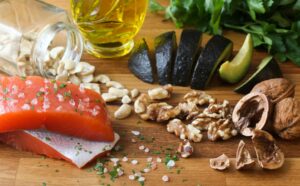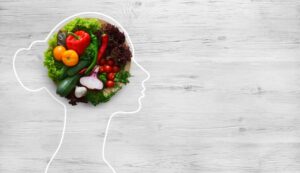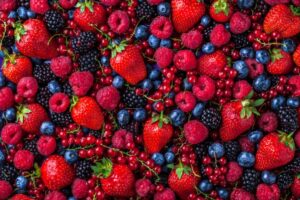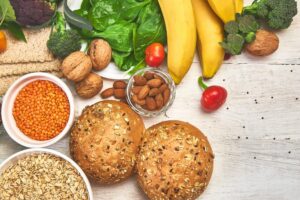We know how to keep our bodies healthy with food, but what about our brain? Nutritionist Ron Hobson suggests what brain food we should be eating – 7 key nutrients for a healthier brain
Our brain is complex and connected to every part of our body.
However, the impact of ageing on our brain starts to occur in our twenties and subsequently begins to decline after that.
But, what if we told you that the foods you choose to eat could future-proof your brain helping to maintain cognitive function, tackle brain fog and ward of dementia? Intrigued?
the foods you choose to eat could future-proof your brain
A campaign called ‘Navigating Brain Health’ by supplement brand Healthspan with award winning nutritionist Rob Hobson takes a look at brain food and how an array of nutrients including vitamins, minerals, essential fatty acids and other compounds can support the health of your brain.
These nutrients are all involved in the development of our brain from a young age but as we age they help support its function and protect it against damage such as that caused by inflammation.
Add these foods to your shopping list and say hello to a better brain…
#1 Omega 3s
Omega 3 fatty acids are incorporated into brain cell membranes, keeping them fluid so electrical and chemical messages can pass through rapidly and the most important are EPA and DHA.
‘EPA is involved in the synthesis and activity of neurotransmitters such as dopamine and serotonin, two feel good hormones, and EPA also has anti-inflammatory actions which may protect brain cells from degeneration’, says Hobson.
The primary source of omega 3 in the diet comes from oily fish (such as salmon, trout, mackerel, herring). However, not everyone enjoys eating oily fish and intakes have been shown time and again to be low.
eating fish twice weekly reduced dementia risk by 44 per cent
Plant sources of omega 3 which is in the form of ALA can be found in nuts, seeds, soy foods and dark green leafy vegetables.
‘The conversion of ALA to the usable forms in the body of EPA and DHA is poor which is why vegans may struggle to get enough,’ explains Hobson.
However, a supplement can help such as Healthspan’s High Strength Omega 3, £14.95. Vegan omega 3 supplements are also available which are sourced from sea algae.
Need another reason to ensure you’re getting enough omega 3? A large study of over 2000 adults found eating fish twice weekly reduced dementia risk by 44 per cent.
READ MORE: Is your bloated stomach ruining your life? 9 ways to relieve symptoms
#2 B vitamins
There are eight B vitamins which as a group are referred to as the B complex.
‘Recent studies have suggested that all the nutrients in this group have a role to play in supporting brain health,’ says Hobson.
‘They act together to enable neurons (aka, our brain cells) to work more efficiently’.
B vitamins also help to remove cell waste allowing cells to function optimally. This waste is mostly in the form of proteins which if left can form clumps that are toxic to the brain. Rob says,
‘Many foods contain B vitamins but to get the most from your diet you should focus on eating wholefoods in their most natural state which includes wholegrains, dark green leafy vegetables, eggs, meat, fish, beans, pulses and lentils,’ explains Hobson.
Vegans can struggle to get enough B12 so should also focus on fortified foods such as nutritional yeast, plant-based drinks (nut, soy, coconut, oat) and cereals.
READ MORE: The 101 on calorie deficit – how important is it for weight loss?
#3 Vitamin D
This vitamin has been shown to be neuroprotective and is involved in regulating genes which are important for brain function.
Vitamin D also helps to reduce inflammation which plays a role in the development of chronic disease and this includes the deterioration of the brain.
Chronic inflammation can impact brain health, leading to cognitive decline according to research published in the journal Neurology.
An exciting world-first study published in The American Journal of Clinical Nutrition, from the University of South Australia involving over 295,000 genetic profiles in the UK Biobank, suggests that low vitamin D levels is associated with reduced brain volumes and that correcting vitamin D deficiency could prevent as many as 17 per cent of cases of dementia.
‘Research has shown that people with low levels of vitamin D perform less well in memory tests, plus, a lack of vitamin D is also linked to poor mood and depression,’ explains Hobson.
Our body gets most of the vitamin D it needs from sunlight, however, for much of the year in the UK, there simply isn’t enough sunlight, so the UK government recommends a daily supplement between the months of October and March.
For people who are dark-skinned, and for those who spend a lot of time indoors and are over 50, all year-round supplementation is recommended.
a lack of vitamin D is also linked to poor mood and depression
Protecting your skin from the harmful effects of excessive sun exposure is important. Still, your skin needs to exposed to some sunlight without sunscreen to absorb vitamin D.
Used properly, even a sunscreen with a sun protection factor of SPF8 reduces vitamin D production in the skin by 95 per cent, while SPF15 reduces vitamin D3 production by 99 per cent.
Unfortunately, unlike most other vitamins, we can’t acquire the vitamin D we need from our diet because there are few food sources. While these include oily fish and liver, they’re not exactly top of most Brits’ weekly diets, although eggs and butter also count.
This is why Public Health England (PHE) recommend that everyone takes 10 micrograms (400 IU) vitamin D per day.
‘Rather than wait until you get sick to pop mega doses of vitamin D, research shows it’s much more effective to supplement daily,’ says Dr Jenna Macciochi, immunologist and author of new book Your Blueprint for Strong Immunity.
‘Aim to get out in the sun for at least 10-15 minutes a day too because getting outdoor has additional known benefits for our wellbeing’.
When choosing a supplement, select one containing the form known as vitamin D3 (cholecalciferol) as this is significantly more effective in maintaining blood vitamin D levels than vitamin D2 (ergocalciferol) form. Try Healthspan’s new vegan delicious blackcurrant Vitamin D3 Gummies, £8.95
READ MORE: 9 daily habits ruining your brain health
#4 Vitamin E
This vitamin is one of several nutrients that act as antioxidants in the body. The role of antioxidants is to protect your body from free radicals.
Contrary to popular belief, free radicals have a useful role to play in the body as they help the immune system destroy foreign invaders.
However, in excess of antioxidants, free radicals can lead to a state of oxidative stress that can damage cells and tissues in the body including those of the brain.
You can boost your intake of vitamin E by eating foods such as olive oil, nuts, nut butter, seeds and wholewheat, avocado, spinach, butternut squash, kiwifruit, broccoli, trout, prawns.
#5 Flavonoids
Never heard of flavonoids? Sometimes known as vitamin P, these are compounds that come from plants, particularly plants of a deep, rich colour. These plant compounds can have a protective effect on the brain.
‘Flavonoids are thought to be beneficial because they help to boost blood flow to the brain. This, in turn, helps to deliver more oxygen and nutrients, such as glucose – the main energy source for neurons’ explains Hobson.
‘Research shows how eating plenty of foods rich in these compounds may help improve memory and learning while also slowing down age-related memory loss’.
they help to boost blood flow to the brain
You can boost your intake of flavonoids by eating foods such as citrus fruits, berries, red and purple fruits and vegetables such as red cabbage, grapes and cherries as well as broccoli, dark leafy greens and asparagus.
Other flavonoid-rich foods include dark chocolate, nuts, onions, ginger, green tea, celery, parsley, oregano and soy foods (including tofu, tempeh, miso, edamame).
READ MORE: 3 ways to reduce stress in 24 hours
#6 Iron
A staggering 27 per cent of women are lacking in iron, as are 50 per cent of teenage girls, something that certainly isn’t ideal during the school years.
‘Iron is essential to produce healthy red blood cells which carry oxygen and nutrients around the body. Aside from delivering oxygen, iron also helps with brain health,’ reveals Hobson.
‘Low iron can lead to tiredness and fatigue impacting on concentration and is also thought to contribute to ‘brain fog’ associated with low circulating oxygen’.
Iron absorption from plant-based foods can be increased by partnering them with a source of vitamin C
You can boost your intake of iron intake by eating meat, beans, pulses, lentils, dark green leafy vegetables, dried fruit and dried spices.
‘Iron absorption from plant-based foods can be increased by partnering them with a source of vitamin C while also avoiding tea with meals.’ adds Hobson.
You might also want to consider a supplement. The Healthspan Love Your Brain supplement, £19.95 contains 28 days of brain-loving nutrients, including iron.
#7 Fibre
Research is continuing to unveil the important role of the gut in many areas of health that go beyond digestion.
‘We’re starting to realise how important these microbes are because they can help us regulate gut-brain communication in a way that is beneficial for our brain and mental health,’ says Hobson.
A diet rich in high fibre foods such as fresh fruits, vegetables, whole grains, nuts and seeds, reflective of the Mediterranean diet can help to promote gut health by ensuring a microbiota rich in beneficial bacteria.
Probiotic supplements are also a useful way to add beneficial bacteria to the gut (try Healthspan’s SuperPro 50, 60 capsules £29.95 and contains five of the best strains in just one vegan capsule).
READ MORE: Need more fibre? Add linseed to your diet
Foods to swerve…
As well as making sure to include certain foods into your diet, it’s also wise to avoid some foods too.
‘Your brain needs to be fuelled and that fuel comes from food so the focus should always be to fill your tank with premium food. High-quality food is abundant in health-giving nutrients while poor quality food can be detrimental to the health of your brain’, says Hobson.
Ultra-processed foods, those high in sugar, bad fats and other compounds, can have a negative impact on brain health. These foods include processed meats, savoury snacks, sugary foods and drinks, and some pre-packaged meals.
‘These foods are high in salt which can increase blood pressure,’ reveals Hobson.
poor quality food can be detrimental to the health of your brain
Indeed, research shows how high blood pressure in mid-life can increase your risk of developing dementia in later life, especially vascular dementia.
Plus, a high intake of refined sugars can promote inflammation and oxidative stress which can also damage cells.
Maintaining a well-balanced diet is proven to support good health and this includes the health of your brain. The Mediterranean diet is a good example and is rich in the nutrients shown to support good brain function.
Research has also suggested this way of eating may also help to prevent cognitive decline in later life. Supplements can have role to play in bridging any gaps that exist in your diet while research continues to provide insight into the potential role they may play in supporting brain health.
Like this article? Sign up to our newsletter to get more articles like this delivered straight to your inbox.


























































